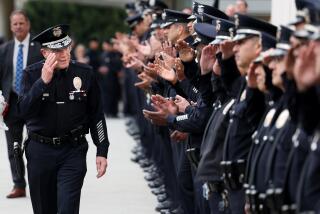A cop in pursuit of trust
AN ANCESTOR of mine, for whom I am named, was the sheriff in Neshoba County, Miss., before the civil rights movement. It’s haunting to see my name stamped into his old tin star. I know almost nothing about the man, but I’m fairly certain William Joshua Beall conceived of law enforcement very differently than I do.
I have spent most of my career with the LAPD in 77th Division -- the heart of South Central -- serving and protecting people whose parents and grandparents migrated here to escape places like Neshoba County.
77th Division occupies less than 12 square miles, roughly from Vernon Avenue south to Manchester Avenue and from Central Avenue west to Crenshaw Boulevard. About 175,000 people live in 77th, mostly Latinos and blacks. So far this year, we’ve had 69 murders.
Most of our murders are gang-flavored, but many are plain Cain -- raw homicidal impulses unchecked by middle-class propriety, the unfocused rage of the desperate and downtrodden. A man murdered over a chicken coop. Another killed over a cold beer on a hot afternoon.
Most of the victims are black men and, as they aren’t apple-cheeked cheerleaders or children, few of their deaths make the news. These men are buried in places like Inglewood Park Cemetery, their pictures silk-screened onto oversized T-shirts and draped over their orphaned toddlers.
Some shooting victims survive, but I wouldn’t call them lucky. They slump in wheelchairs with atrophied muscles, their fingers curled and claw-like, still defiantly wearing those goofy, straight-billed, powder-blue Yankees caps, still scowling at me as I drive past. They’re the paralyzed veterans of South Central’s sectarian violence -- gang feuds so ancient that their origins are lost even to the gangsters.
Black men have bled and died down here for generations. When you process crime scenes in 77th and collect the empty shell casings from the ground, sometimes you find older casings, tinged with rust -- the leftovers from some earlier, unreported shooting. Tragedy heaped upon tragedy, death upon death, and the trail of blood stretches back further than most of us care to look.
Spend enough time in South Central and you make some unpleasant historical connections. You begin to see the body count not just as the work of Crips and Bloods but as the legacy of restrictive housing covenants and economic isolation. Believe me, this nation’s history of racial oppression doesn’t feel so abstract after a few autopsies.
I know a lot of black people still don’t trust cops. Can’t say I blame them. For generations, police were the street-level enforcers of segregation and miscegenation laws. We were the guys with the dogs and water hoses at Selma. Little wonder the relationship between the black community and law enforcement in this country remains badly broken.
Folks in South Central remain understandably wary of cops like me. I walk into their lives uninvited, at inopportune moments -- a retail sales rep from the same corporation that brought them the Middle Passage, Jim Crow, the Tuskegee syphilis experiments. Some of them hate me on sight. Others want to trust me, but it’s hard. It is the nature of policing to displease. This is inherently violative work. We’re not firefighters, after all. We pull people over. We ask unpleasant questions. We arrested your nephew, and he swears he didn’t do it.
Many people are content to let poor black men kill one another. Fortunately, the men and women I serve with are not among them. Our vigorous pursuit of black perpetrators is legendary; we’re less famous for our corollary efforts on behalf of black victims. Officers work in 77th Division because they believe the powerless are worth protecting.
A recent article in The Times reported that the LAPD has fallen behind the Sheriff’s Department in recruiting. The article blamed this hiring shortfall, in part, on minorities’ lack of trust in the LAPD. Eulia Mae Love. Rodney King. Rampart. Rocked by scandal after racially-charged scandal, this department struggles to reinvent itself while under a federal consent decree. Meanwhile, another generation of dedicated officers nears retirement age.
So here’s my totally unauthorized recruiting pitch: If you believe justice belongs to the pauper as well as the prince, if the life of the untouchable is as sacred to you as the life of the Brahmin, if you believe safety is a civil right owed both the gated community and the blighted one, then take the LAPD written exam. Hey, come work the south end. We’re still fighting an uphill battle, and we could sure use the help.
Progress is slow, but it is happening. In my eight years, I’ve won a few people over. They rage to me about a videotaped use-of-force on the TV news, or some high-profile shooting, certain they know the latent sentiments behind the official explanations. “But you’re one of the good ones,” they tell me.
That’s not a bad start, really, considering we’re all not that far out of Neshoba County.


